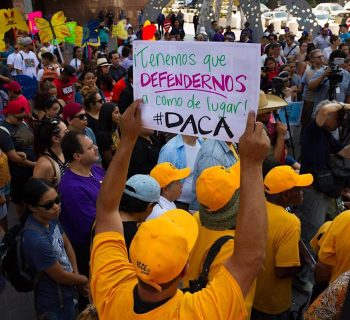By David Luhnow ~ Wall Street Journal ~ March 1, 2018
MEXICO CITY—Hola Code looks like any other coding academy, with twenty-and thirty-somethings seated in computer-lined rows eager to learn software programming and land a good job.
But the 22 students at this non-profit startup have unusual life stories: Most are Mexican citizens who grew up in the U.S. after being brought there as children by parents who were undocumented immigrants, and were later deported or moved back to Mexico to avoid deportation.

PHOTO:JAKE NICOL/THE WALL STREET JOURNAL- Miriam Álvarez was brought to the U.S. illegally by her parents as an infant. She returned to Mexico when she was 14 and is now learning to code at the Hola Code in Mexico City.
Now, they are getting a second shot at the American dream—in Mexico.
The same American policies that pushed them to Mexico—combined with a rising global need for programmers and Mexican tech wages that are about a quarter that of Silicon Valley—promise to drive a growing programming industry south of the border.
“Until recently, Mexico hadn’t been that attractive an option for U.S. firms because of a lack of software engineers and people who spoke English. We can deliver both,” said Marcela Torres, the 30-year-old founder of Hola Code.
At Hola Code, the students resemble those at programming academies in San Francisco and Austin. Most are millennials, speak English and play on their phones during breaks. Many grew up thinking of themselves as American. They share work space at a bustling WeWork in Mexico City, surrounded by hammocks and espresso machines.
Miriam Álvarez is one of them. The 21-year old didn’t know she wasn’t an American until she was 14, the day her parents sat her down in the family living room in Bradenton, Fla., and said that when she was a few months old the family had crossed into the U.S. illegally and now planned to return to Mexico to avoid deportation. Her parents had never told her and her siblings before because they didn’t want them to live in fear.
“Suddenly I was like, ‘OK, I’m not an American anymore,” she said.
Imbalanced Ledger
Demand for U.S. visas for skilled immigrant workers is growing, especially for computer-related jobs.

Another Hola Code student, Ricardo “Ritchie” Varona, was at a U.S. army boot camp in 2008 when he was deported to Mexico, a place he hadn’t been since he was 11 and where few family members remained. The adjustment was hard: He ended up sleeping under a bridge and juggling as a street clown at stop lights for spare change.
Growing numbers of U.S. software companies, among them OracleCorp. , Amazon.comInc.and a host of startups, are hiring in Mexico, which is providing a rival location to places like India and Canada, which last year streamlined the process of getting specialized work visas.
U.S. tech firms suffer a perennial shortage of software engineers, leading to a battle for talent and costly salaries. One longstanding solution—hiring immigrants in the U.S.—has grown tougher as the U.S. discourages immigration and toughens the ability to get specialized American visas for skilled workers, called H-1B.

PHOTO: HECTOR GUERRERO/BLOOMBERG NEWS- Wizeline, a San Francisco tech firm, is encouraging programmers to move to Mexico to fill jobs in its Guadalajara office.
Mexican officials are shopping Guadalajara—with its 115,000 tech-related workers—as a growing tech hub that is far closer in distance and time zone than other offshore tech centers like India. A Jalisco state website, where Guadalajara is the capital, tells prospective investors: “We want you—for Mexico’s Silicon Valley.”
Tougher Going
In the past five years, U.S. employers have found the visa application process has become:
![]()
Wizeline, a San Francisco tech firm that plans to hire some of the Hola Code graduates in its Guadalajara office, has more than doubled its number of employees in Guadalajara to about 330 from a year earlier, said CEO Bismarck Lepe. There, employees write software for clients ranging from Nike to NewsCorp, the company that owns The Wall Street Journal.
The company is also attracting talent from overseas. Ziad Mohamed is one of eight Egyptian software engineers to come to Guadalajara to live their Silicon Valley dream. He cited worries about growing anti-immigration and anti-Muslim sentiment in the U.S. as factors.
“It’s hard for Egyptians to get visas, and you wonder how welcome you would be,” said Mr. Mohamed, who arrived in Mexico last year and soon persuaded his best friend, 22-year-old programmer Mohamed Issa, to join him. They are one of 16 nationalities represented at the company.

PHOTO: HECTOR GUERRERO/BLOOMBERG NEWS- Employees play ping pong at the Wizeline office in Guadalajara.
Some 72% of U.S. companies want an increase in the H-1B visa cap, according to a 2017 Harris poll of about 400 of them. Because of the difficulty in getting more visas, 22% of U.S. firms said they had relocated some work overseas as a result. More than half the surveyed companies said they had more difficulty getting H-1B visas for workers in recent years.
And then there are the Dreamers, a class of 1.8 million people whose undocumented immigrant parents brought them to the U.S. as children.
Wizeline has invited Dreamers to apply for jobs at a time when they face possibly deportation after President Donald Trump last year ended the Obama-era program to shelter them in the U.S.
“I want to get more immigrants to come (to Mexico),” said Mr. Lepe, the CEO. “I tell them ‘You understand U.S. culture, speak English, and all these multinationals want you.’”

PHOTO: HECTOR GUERRERO/BLOOMBERG NEWS- Employees work on laptop computers at the Wizeline office in Guadalajara.
To find students for Hola Code, the founder, Ms. Torres recently stood outside call centers, where many returnees land to put their English skills to use, and handed out fliers in Spanglish: “Tired of a lack of opportunities, aqui y alla [here and there]?”
She offered prospective students pizza and beer, and explained the rules: study six days a week, 12 hours a day and receive free tuition and a living stipend of about $250 a month to be repaid once they find jobs at software firms.
“I thought it was some kind of scam or too good to be true,” said Cesar Tapia, 29, who grew up in Los Angeles and returned to Mexico in 2012 because his lack of legal status in the U.S. made it hard to get a good job. “But now I feel like I’ve found a whole new family.”
Source: David Luhnow ~ Wall Street Journal






